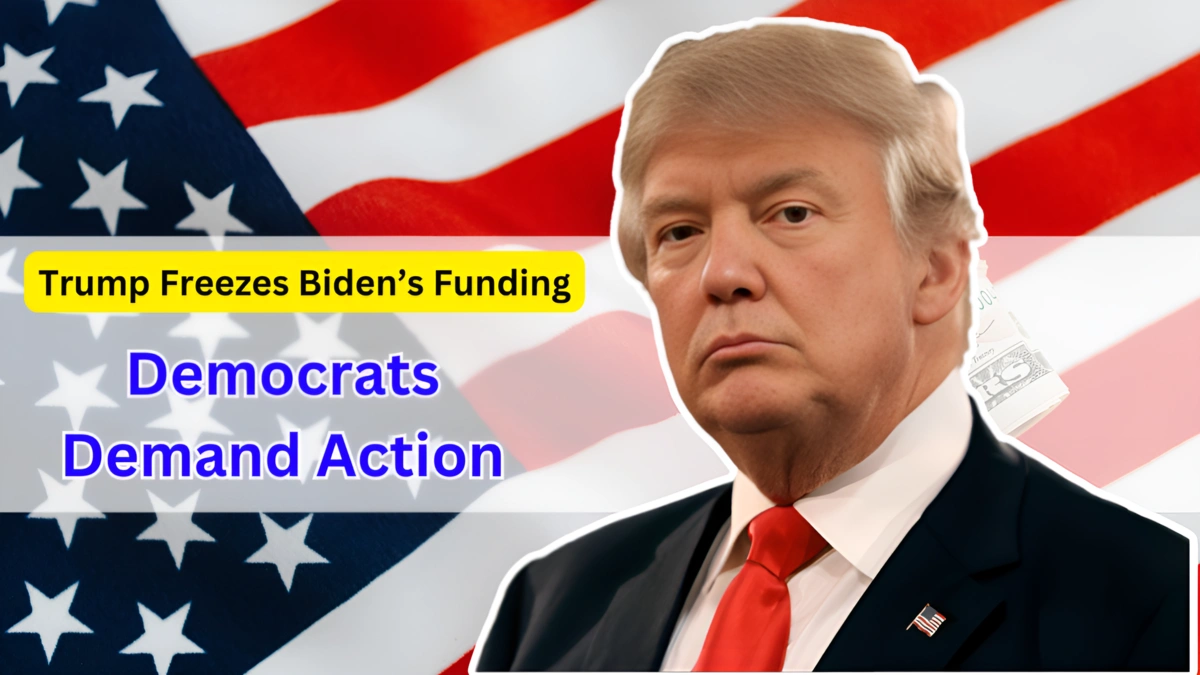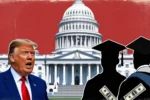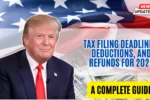Trump Freezes Biden Funding: Democrats are raising alarms over former President Donald Trump’s recent executive order to freeze funding approved in two of President Joe Biden’s signature legislative accomplishments: the Inflation Reduction Act and the Bipartisan Infrastructure Law. The move, which pauses the disbursement of funds for several key projects, has ignited a fierce partisan battle in Washington.
Trump’s executive order halts the release of funds allocated through these landmark laws, which were intended to drive progress in areas like clean energy, infrastructure, and climate action. Democrats argue that the order is a clear violation of the Impoundment Control Act (ICA), a law that limits the president’s authority to withhold funds appropriated by Congress. The controversy revolves around the legality of Trump’s actions and the potential disruption of critical investments in climate, infrastructure, and public services.
A Bold Challenge to the Impoundment Control Act
The Impoundment Control Act, passed in 1974, was designed to prevent presidents from unilaterally withholding or delaying congressionally-approved funds. Under the ICA, the president can only pause funds under certain circumstances and must notify Congress of such actions. Democrats, including Representative Rosa DeLauro (D-Conn.), who serves as the top Democrat on the House Appropriations Committee, have been vocal in their criticism of Trump’s move. DeLauro called the freeze “illegally impounding” critical investments and warned that it creates uncertainty for companies, nonprofits, and local governments relying on the funds.
Trump’s freeze impacts a wide range of programs funded through the Inflation Reduction Act and the Bipartisan Infrastructure Law. These include initiatives designed to accelerate the transition to clean energy, reduce pollution, improve public infrastructure, and promote the development of electric vehicle (EV) chargers. Some of the funds also support rebates for homeowners adopting climate-friendly technologies and tax incentives for businesses investing in clean energy.
The Republican Defense: Executive Authority
While Democrats have decried the freeze, Republicans have come to Trump’s defense, arguing that the former president’s actions fall within his executive powers. According to Republican lawmakers like Senator John Hoeven (R-N.D.), the freeze is part of Trump’s broader strategy to claw back spending and align with fiscal priorities. Hoeven, a prominent figure in the GOP’s spending discussions, emphasized that Republicans have long sought to reduce government spending, and freezing funds is one way to achieve that goal.
Furthermore, Trump’s supporters argue that the freeze is part of a broader effort to challenge policies they believe are overreaching, such as the EV mandates outlined in the Inflation Reduction Act. Trump’s order outlines U.S. policy to eliminate the electric vehicle mandate, ensuring “a level regulatory playing field for consumer choice in vehicles.” However, the exact scope of the freeze remains unclear, and its impact on specific projects is a subject of ongoing debate.
A Murky Executive Order
One of the main points of contention is the lack of clarity surrounding the details of Trump’s executive order. While the White House issued a memo specifying that the freeze applies only to funds for programs, projects, or activities that may be affected by certain policies, it is still uncertain which projects and initiatives are actually impacted. Some climate advocates, including Patrick Drupp of the Sierra Club, expressed concern that the freeze could undo years of progress in combating climate change at a time when urgent action is needed.
Democratic lawmakers, particularly in the Senate, have also raised alarms about the potential consequences of Trump’s move. Senate Minority Leader Chuck Schumer (D-N.Y.) warned that Trump’s nominee to head the Office of Management and Budget, Russell Vought, could exacerbate the situation by deciding which funds move forward, further increasing uncertainty for federal projects.
Legal and Constitutional Implications
Legal experts have weighed in on the constitutional aspects of Trump’s freeze. While some argue that the Impoundment Control Act provides the president with limited power to delay spending, others contend that pausing disbursements that have already been allocated is a violation of contract law. Bobby Kogan, a former Senate budget aide, argued that Trump’s freeze is an illegal step, particularly when it involves funds for projects that have already been contracted or obligated.
Vought, a former budget chief under Trump, has defended the freeze, arguing that it represents a “programmatic delay.” He has also reiterated his stance that the Impoundment Control Act is unconstitutional, a position that has drawn significant opposition from Democrats.
Partisan Tensions Heighten
As the legal and political ramifications of Trump’s freeze continue to unfold, partisan tensions in Washington are reaching a fever pitch. Democrats are accusing Trump of undermining critical investments and potentially violating the law, while Republicans are defending his actions as a legitimate exercise of presidential power. The outcome of this dispute could have lasting implications for future government spending and the balance of power between Congress and the executive branch.
In the coming weeks, lawmakers from both parties are likely to continue pressing the issue, and the final resolution could shape the direction of U.S. policy on climate change, infrastructure development, and fiscal responsibility for years to come. As of now, the freeze remains a flashpoint in the ongoing political battle between Republicans and Democrats.



